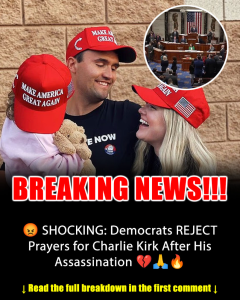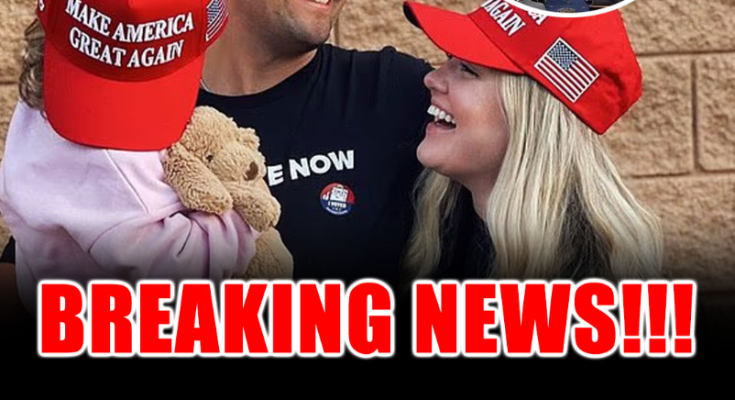The House of Representatives became a battleground of grief, fury, and ideological tension on September 10, 2025, as lawmakers clashed over a request to pray for Charlie Kirk, the conservative activist who was fatally shot just hours earlier during a campus event in Utah. What began as a solemn moment of silence quickly devolved into a shouting match that laid bare the raw divisions in American politics—and the emotional toll of violence that now seems to haunt every corner of public life.
A Moment of Silence Turns Volatile
Speaker Mike Johnson, visibly shaken by the news of Kirk’s death, opened the House session with a moment of silence. Kirk, the 31-year-old founder of Turning Point USA, had been shot in the neck while speaking at Utah Valley University. His death reverberated across the political spectrum, prompting tributes, condemnations, and calls for unity.
But unity was not what followed.
As the silence ended, Representative Lauren Boebert of Colorado rose and asked the chamber to join her in a spoken prayer for Kirk and his family. “Silent prayers get silent results,” she said, her voice cutting through the quiet. What came next was a chorus of “No!” from Democratic lawmakers, some of whom shouted about a school shooting that had occurred earlier that same day in Colorado.
The Flashpoint: Prayer and Protest
Boebert’s request was met not just with rejection but with outrage. Democrats accused Republicans of politicizing grief and ignoring other tragedies. One Democrat shouted, “Pass some gun laws!” while another referenced the injured children in Colorado. Boebert tried to clarify that she intended to include those victims in her prayer, but the moment had already spiraled.
Representative Anna Paulina Luna of Florida, who had previously worked with Kirk at Turning Point USA, erupted in anger. “You caused this!” she shouted across the aisle, accusing Democrats of fostering the rhetoric that led to Kirk’s assassination. Her words were met with jeers, and according to multiple reports, expletives flew from both sides.
Speaker Johnson banged his gavel repeatedly, pleading for order. “Let’s wait a minute. The House will be in order,” he said, his voice rising above the chaos.
The Emotional Undercurrent
The eruption on the House floor wasn’t just political—it was deeply emotional. Johnson, who had known Kirk personally, described him as a close friend and confidant. “Political violence must be called out,” he told reporters earlier that day. “We need everyone who has a platform to say this loudly and clearly: we can settle disagreements and disputes in a civil manner”.
For Boebert and Luna, the moment was personal. Kirk had been a fixture in conservative circles since founding Turning Point USA in 2012. His death wasn’t just a political loss—it was a human one. Boebert later posted on X, “Charlie Kirk boldly and unapologetically invoked the name of the Lord Jesus Christ when he spoke across the country. That’s part of his legacy”.
The Deeper Divide
The chaos in the House was emblematic of a deeper fracture in American society. The refusal to pray for Kirk wasn’t just about procedure—it was about what he represented. To many Democrats, Kirk was a polarizing figure whose rhetoric had contributed to the very climate of hostility that led to his death. To Republicans, he was a martyr for free speech and conservative values.
Representative Joe Morelle of New York explained that the rejection of Boebert’s request was also procedural. “We don’t even do that for fallen members,” he said, noting that the House has a standard protocol for moments of silence and prayer. “When you violate it and create exceptions, it leads to uneasiness”.
But others saw the moment as a missed opportunity for unity. “Political violence is scary for all of us,” said Representative Susie Lee of Nevada. “That type of backlash doesn’t help things”.
The National Response
Outside the chamber, reactions poured in. President Donald Trump called Kirk “The Great, and even Legendary,” and blamed “radical left political violence” for the assassination. “This kind of rhetoric is directly responsible for the terrorism we’re seeing in our country today,” he said in a video message.
Flags over the White House were lowered to half-staff. Trump properties followed suit. Eric Trump announced that all Trump-owned buildings would honor Kirk’s memory in the same way.
Meanwhile, social media lit up with clips of the House chaos. Republican Vivek Ramaswamy posted, “This is truly sad for our country,” reacting to the video of Boebert’s prayer request being shouted down.
A Nation in Mourning—and Conflict
The death of Charlie Kirk and the subsequent eruption in Congress mark a sobering moment in American history. It’s a reminder that even in grief, the nation struggles to find common ground. The House floor, meant to be a place of deliberation and dignity, became a theater of emotional warfare.
Yet beneath the shouting and the gavel strikes lies something more profound: a yearning for meaning, for ritual, for connection. The request to pray wasn’t just political—it was human. And the rejection wasn’t just procedural—it was a reflection of a country grappling with how to mourn, how to heal, and how to move forward.


